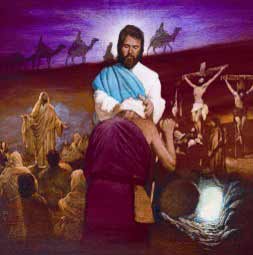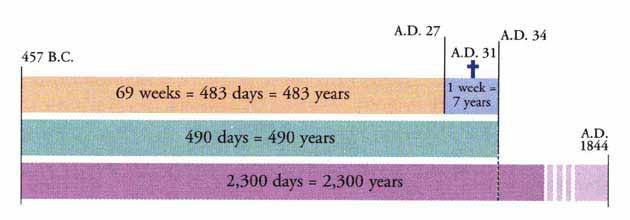|
FOCUS ON
DANIEL - LESSON 6
God Steps In
Daniel 9
When
Mrs. Murphy took over the fifth grade at a suburban elementary
school, all the other teachers warned her about Jimmy. He was a
real troublemaker, always causing problems. She had better keep
an eye on him if she didn't want her class constantly disrupted.
So during recess
period on the first day of school, Mrs. Murphy asked Jimmy to stay
inside; she wanted to have a little talk. Jimmy slumped into a
chair with a downcast look. He knew what was coming. Mrs. Murphy
sat down beside him and began, "Jimmy, I've heard all kinds of
things about you. But you know what? I don't believe a word of
it! You and I are going to get along just fine."
Jimmy stared
back wide-eyed. No one had ever expressed faith in him before.
No one had expected the best. And something about the look in Mrs.
Murphy's kind eyes made him want to be a good kid more than anything
in the world. Jimmy skipped all the way out to the playground.
That year he became the model student in the fifth grade.
 The message of Daniel
9 is that we have Someone who stands up for us in this life. No matter
what other people are saying about us, no matter how we might be attacked,
there is Someone who always believes in us. And that Someone is Jesus
Christ. It's wonderful to have Him on our side.
The message of Daniel
9 is that we have Someone who stands up for us in this life. No matter
what other people are saying about us, no matter how we might be attacked,
there is Someone who always believes in us. And that Someone is Jesus
Christ. It's wonderful to have Him on our side.
At the close of Daniel 8, we left the prophet in distress. His vision
of the "little horn" trampling God's sanctuary made him sick for several
days. Daniel tells us he "was astonished by the vision, but no one understood
it" (Daniel 8:27). After awhile, he went back to his government duties
in the capital.
Thirteen years
pass, and Daniel is still haunted by this vision he can't quite
understand. He begins studying the writings of the prophet Jeremiah
concerning Jerusalem. Jerusalem has been destroyed; it's been lying
in ruins for almost seventy years. Daniel knows all about that
because he was a young man when this occurred. Daniel reads these
words in Jeremiah 25:10-14:
"'Moreover I
will take from them the voice of mirth and the voice of gladness,
the voice of the bridegroom and the voice of the bride, the sound
of the millstones and the light of the lamp. And this whole land
shall be a desolation and an astonishment, and these nations shall
serve the king of Babylon seventy years. Then it will come to pass,
when seventy years are completed, that I will punish the king of
babylon and that nation, the land of the Chaldeans, for their iniquity,'
says the LORD; 'and I will make it a perpetual desolation. So I
will bring on that land all My words which I have pronounced against
it, all that is written in this book, which Jeremiah has prophesied
concerning all the nations. (For many nations and great kings shall
be served by them also; and I will repay them according to their
deeds and according to the works of their own hands.)'"
Daniel realizes
that the seventy years have almost passed, and yet there are no
signs that God is turning things around. There are no indications
that the Hebrews will ever restore Jerusalem or rebuild the temple.
Daniel thinks about his vision described in chapter 8. There he
was told that after 2,300 days the sanctuary would be restored.
What did that mean? It's likely that Daniel was familiar with the
principle, spelled out in Ezekiel, that in long-term, symbolic
Bible prophecies a day stands for a year (Ezekiel 4:6).
What, then,
was he to make of Jeremiah's prediction? Could the sanctuary really
be restored after seventy years? Or would it lie in ruins for 2,300
years? Daniel couldn't come up with a clear answer, so he decided
to respond to a divine invitation given through the prophet Jeremiah: "Then
you will call upon Me and go and pray to Me, and I will listen
to you. And you will seek Me and find Me, when you search for Me
with all your heart. I will be found by you, says the Lord, and
I will bring you back from your captivity" (Jeremiah 29:12-14).
What Daniel
did in his time of anxiety is an excellent pattern for us to follow.
He didn't just give up when he ran into a perplexity in Scripture;
he didn't just give in to his distress. He prayed for help; he
asked God for answers. Most of Daniel 9 consists of his prayer.
And what a prayer it is!
1. What did Daniel do before he prayed to God about the things that
concerned him? (Daniel 9:3.)
He asked all his friends to forgive anything he had done against them.
He fasted and put on sackcloth and ashes.
He meditated on the law of God.
Sackcloth was
a coarse fabric made from the hair of goats or camels. Individuals
put on sackcloth and spread ashes over their heads as a way of
expressing intense grief. Fasting, or eating sparingly, for short
periods is a way to clear the mind for better communication with
God. It demonstrates an earnest desire for spiritual growth and
guidance.
2. Daniel began his prayer by confessing his sins. These sins included:
(Daniel 9:5-11.)
rebellion against God, disobedience to His laws, and rejection of God's
prophets.
eating food offered to idols, impure thoughts, and covetousness.
not trusting God's promises, not offering the required sacrifices, and
pride.
Daniel goes
on to identify the reason behind the disaster that overwhelmed
Jerusalem—Israel's stubborn refusal to repent. God used the
misfortune that befell Jerusalem to try to wake up His people and
make them realize their need to follow
Him (vss. 12-14). Daniel acknowledges God's sovereignty over human
affairs.
3. What past event did Daniel recall as an example of God's saving power? (Daniel 9:15.)
God sending a worldwide flood in Noah's day.
God destroying the wicked cities of Sodom and Gomorrah.
God leading the Hebrews out of Egyptian captivity.
- Daniel states
that Israel's rebellion has allowed others to laugh at God and
deride His power (vs. 16).
- Daniel asks
God to be favorable to his request and not turn away from him.
He also asks God to remember His sanctuary (vs. 17).
- Daniel asks
God to look on him with favor and listen to his request, not
because Daniel or the Israelites deserve this in some way, but
simply because God is full of love and mercy (vs. 18).
- Daniel
ends by saying, "God, hear, forgive, listen, act, do not
delay!"
Daniel has given
us an excellent example to follow. In his hour of distress he shows
us the way to peace of mind—prayer. Prayer is an antidote
to worry and anxiety. Through prayer we gain the assurance that
our sins are forgiven. Through prayer we can improve our relationships.
So pray. Pray alone and pray with others.
§ § §
Kampili,
a notorious Japanese prison camp on the Celebes Islands during
World War II, wore down the spirits of the American and European
civilians confined there. But one woman, Darlene Deibler Rose,
responded to the harsh conditions by going on a prayer offensive.
She petitioned God on behalf of Mr. Yamaji, the brutal camp commander
who often beat prisoners unmercifully. One day, standing in his
office, she had an opportunity to share a few words about the almighty
Creator who had died for all—even the camp commander. Tears
began running down the man's cheeks. After that, he tried to improve
camp conditions.
 While
working in the hospital, Darlene prayed for Rachel, a Jewish internee
who was gasping for breath, trying to fight off a serious asthma attack.
She knelt by the bed and asked God to touch Rachel's body. Immediately,
Rachel's breathing eased, and she was able to return to the barracks
the next morning. While
working in the hospital, Darlene prayed for Rachel, a Jewish internee
who was gasping for breath, trying to fight off a serious asthma attack.
She knelt by the bed and asked God to touch Rachel's body. Immediately,
Rachel's breathing eased, and she was able to return to the barracks
the next morning.
Darlene could
easily have given in to the despair around her. God could have
seemed terribly distant. But she found Him in the here and now
because that's where she looked. In her effort to stay close to
God she continually ran into His small favors. This was a woman
who could look up at the stars from a bomb-blackened shelter and
rejoice that the Creator of the heavens had entered into a relationship
with her: "Oh the wonder of His love for me and His personal concern
for me, as an individual, was overwhelming."
Perhaps the
example of Darlene and the earnest prayer of Daniel in chapter
9, have inspired a desire in you to seek God in a new way in prayer.
What would you like to say to Jesus right now?
Something remarkable
happens as Daniel continues his prayer.
4. While Daniel was praying, who came to visit him? (Daniel 9:20, 21.)
His three friends-Shadrach, Meshach, and Abednego.
King Darius.
Gabriel.
Daniel recognizes
the angel Gabriel as the same being who had earlier given him the
message about the sanctuary being restored in 2,300 days.
5. What was the reason for this visit? (Daniel 9:22, 23.)
To encourage Daniel to have greater faith in God.
To let Daniel know that he was being promoted to a higher office in
the government.
To help Daniel understand the vision God had given him earlier.
Daniel must have been quite excited. He is troubled concerning the future
of the Jews and that 2,300-day time period—and now an angel has
come from heaven as his private tutor! Gabriel's mission is to explain
the meaning of the 2,300 days since that is what Daniel didn't understand
in his earlier vision (Daniel 8:13, 14, 26).
Gabriel begins
his explanation of the 2,300-day prophecy with a statement about
time and the future of the Jews and the city of Jerusalem.
6.
How long would God grant a period of probation to Daniel's people, the Jews? (Daniel 9:24.)
"Seventy weeks."
"Seven hundred years."
"Seven thousand years."
We can break down the seventy weeks as follows:
1 week = 7 days
70 weeks x 7 days = 490 days
As previously
mentioned, in symbolic Bible prophecy one day equals one year (Numbers
14:34, Ezekiel 4:6). If one prophetic day equals one literal year,
490 days would equal 490 years.
In Hebrew, the
word "determined" literally means "to cut," "to divide" or "to
amputate." Thus 490 years, which is the probationary time for Israel,
was to be "cut off." But "cut off" from what? The answer comes
from Gabriel's explanation in Daniel 9. Remember he'd told Daniel
that he was sent to explain the part of the vision of Daniel 8
that Daniel did not understand—the explanation of the 2,300
days. Gabriel begins his explanation by saying that 490 years were
to be "cut off" or removed, from the 2,300 days.
Here is the
answer to one of Daniel's questions about the length of the 2,300
days. It is impossible to cut 490 years from 2,300 literal days since
2,300 literal days add up to only about six years. The solution
is clear—the 2,300 days must represent 2,300 years.
In
diagram form, the prophecy would look like this:

7. When does the time granted to the Jews begin? (Daniel
9:25.)
With the birth of Jesus.
With
a decree to restore and rebuild Jerusalem.
With
the death of Jesus on the cross.
Daniel must have
been excited. Jerusalem was going to be restored after all! He
learns about the future of his beloved city. And he also learns
the beginning date for the 2,300-day/year prophecy. It starts when
the decree is given to rebuild Jerusalem. As it turns out, three
decrees are recorded by Ezra the prophet.
The first decree
was issued in 537/538 B.C. by Cyrus the Great. This decree permitted
a resettlement of the Jews in Jerusalem and gave them permission
to rebuild the sanctuary (Ezra 1:1-11).
The second decree
was issued in 519 B.C. by Darius I Hystaspes. His proclamation
simply confirmed the first decree (Ezra 6:6-12).
The third decree
was issued in 457 B.C. by Artaxerxes I Longimanus. This decree
commissioned Ezra with full political and religious authority to
rebuild Jerusalem. This decree is the one that actually authorized
the rebuilding of Jerusalem (Ezra 7:11-26). This decree is regarded
as the one which fulfilled prophecy, the one which serves as the
starting date for the 2,300-day/year period.
Read
Daniel 9:25-27.
The
Messiah the Prince (Jesus) is the central figure in these verses and
in the remainder of the discussion concerning the 490 years. Let's look
carefully at the evidence given.
8. According to the prophecy, how many prophetic
"weeks" pass between the beginning of the time allotted
to the Jews and the appearance of the Messiah?
(Daniel 9:25.)
Two weeks plus sixty-one weeks-or sixty-three weeks.
Four weeks plus sixty-two weeks-or sixty-six weeks.
Seven weeks plus sixty-two weeks-or sixty-nine weeks.
7 weeks
+ 62 weeks = 69 weeks
69 weeks, or 483 days (69 x 7 days in a week) = 483 years
In other words,
if the Autumn of 457 B.C. is our starting date for the prophecy,
adding 483 years to it would take us to A.D. 27. The New Testament
reveals that Jesus began His earthly ministry by being baptized
by John the Baptist in A.D. 27 (Matthew 3:13-17).
Adding
this information to our diagram, it would look like this:

Jesus was to be crucified
in the middle of the last prophetic week. The last prophetic week would
equal seven years. If the beginning date of the last week is A.D. 27,
then adding seven years would take us to A.D. 34. Jesus was crucified
in the middle of the week—this would be A.D. 31. Verse 27 states
that Jesus' crucifixion in the middle of the week would bring an end
to the sacrifices and offerings in the temple. Why? Because Jesus is
the Lamb of God, the One whom the earthly sacrifices represented. Once
Jesus died as the supreme sacrifice there was no need for the ceremonial
sacrifices which had pointed forward to His death.
If Jesus died in
A.D. 31, then the remaining three and a half years of the prophetic
week would take us to A.D. 34. According to the prophecy, this date
marks the end of the 490-year period. When that period ended, it was
the end of probationary time for Israel as a nation. As it turns out,
in that year, A.D. 34, Stephen made a moving appeal to the leaders
of the Jewish Sanhedrin to turn back to God. The book of Acts tells
us that the Jewish leaders rejected Stephen's appeal and then stoned
him to death (Acts 7:54-60).
After the martyrdom
of Stephen, the gospel was proclaimed to the Gentiles, but Israel's
role in God's plan of salvation changed. The
Christian church came to the forefront in taking the gospel to the
world. The New Testament calls the church "new Israel" or "spiritual
Israel."
A diagramed
look at the additional prophetic information about the ministry of Jesus
would look like this:

The first portion
of the 2,300-day/year prophecy covers the 490 years relating to Israel's
fate and the birth and death of Jesus. However, we still have 1,810
years left to equal the 2,300 days/years that Daniel first asked about.
Adding 1,810 years to A.D. 34 brings us to the year A.D. 1844. (In
other words, the 2,300-year period that began in 457 B.C. ends in A.D.
1844).
Our diagram
is now complete:

What
happened in 1844?
According to the prophecy in Daniel 8:14, the sanctuary would be cleansed
at that time. We know that when Jesus died in A.D. 31, the sacrificial
system and sanctuary services ceased to have a divine purpose on earth.
God expressed that fact very dramatically when, at the moment of Jesus'
death on the cross, the curtain inside the temple was miraculously torn
in half (Matthew 27:51). A few years later, in A.D. 70, the Romans destroyed
the temple in Jerusalem.
Then what sanctuary
was left to be cleansed in 1844 at the close of the 2,300 years?
The only sanctuary left is the sanctuary in heaven. The Hebrew temple
on earth was a model of the one in heaven. The heavenly sanctuary is
the sanctuary where Jesus went to minister after His resurrection. This
is where Jesus functions today as our High Priest.
What does the
cleansing of the heavenly sanctuary mean for us?
In the Old Testament sanctuary service, cleansing the sanctuary meant
that all the sins forgiven during the year and taken into the sanctuary
by the High Priest were blotted out. The people regarded this Day of
Atonement as a time of divine judgment. God was making it possible to
declare the people blameless before Him—forgiven, pardoned, and
accepted.
 We
can conclude, then, that in A.D. 1844 a similar event began—a cleansing
of the heavenly sanctuary. God immediately forgives all the sins which
we confess to Him. But in this work of cleansing, He does something
more to give us assurance. He blots out the record of sin in heaven
forever. When your name comes up in this time of investigation (judgment),
Jesus states that you are safe to save for eternity because you belong
to Him and your sins are forgiven. The watching heavenly universe agrees
that you belong to Jesus and that your sins should be cleansed from
the sanctuary. This is a time when Christ declares who has chosen Him
and eternal life and who has chosen Satan and eternal death. When Christ
returns to earth at His second coming, He has already determined who
He is going to take back to heaven with Him. He has already made sure
that not a single person who has trusted in Him as Savior and Lord will
be left behind. If there is any chance to save a human being, without
violating his or her will, then our Lord will find a way to do it. We
can conclude, then, that in A.D. 1844 a similar event began—a cleansing
of the heavenly sanctuary. God immediately forgives all the sins which
we confess to Him. But in this work of cleansing, He does something
more to give us assurance. He blots out the record of sin in heaven
forever. When your name comes up in this time of investigation (judgment),
Jesus states that you are safe to save for eternity because you belong
to Him and your sins are forgiven. The watching heavenly universe agrees
that you belong to Jesus and that your sins should be cleansed from
the sanctuary. This is a time when Christ declares who has chosen Him
and eternal life and who has chosen Satan and eternal death. When Christ
returns to earth at His second coming, He has already determined who
He is going to take back to heaven with Him. He has already made sure
that not a single person who has trusted in Him as Savior and Lord will
be left behind. If there is any chance to save a human being, without
violating his or her will, then our Lord will find a way to do it.
The work of the
investigative judgment began in 1844. When this work of investigation
is over Jesus will take us home!
The apostle Peter
looked forward to this final blotting out of human sin. He wrote, "Repent
therefore and be converted, that your sins may be blotted out, so that
times of refreshing may come from the presence of the Lord" (Acts 3:19).
Jesus longs to banish our sins as far away as "the east is from the
west" (Psalm 103:12).
Many people become
nervous when they hear about the great Judgment Day. We instinctively
fear it. Who can stand before a holy God and feel blameless? That's
one reason God gives us this assurance about the cleansing of the sanctuary.
He wants to make sure that we understand that the judgment takes place
in a sanctuary setting where Jesus is our High Priest.
In the judgment
Jesus stands up as our great Advocate. All the record of our wrongs,
no matter how ugly, no matter how lengthy, doesn't count when Jesus
says, "My blood has been shed for this repentant believer." If you
have accepted Christ as your Savior and choose to follow Him, His perfect
life covers your imperfect life. His blood washes away every trace
of your sin. You can count on Him. He's never lost a case yet. And
because of the work of Jesus, our wonderful High Priest in heaven,
when the whole universe looks at you, they see only the perfect life
of Jesus. When God the Father looks at you, He sees His beloved Son.
You are accepted in the beloved Son. You are a child of God who belongs
in heaven. This is how God lavishes His grace upon us. This is the
good news of the gospel.
Because Jesus is
confident that believers will never sin again after they enter heaven,
He clears their record of every trace of sin—it is blotted out
forever. Then, His work of investigative judgment complete, He returns
to earth to bring believers their reward.
"Behold, I am coming
quickly, and My reward is with Me, to give to every one according to
his work. I am the Alpha and the Omega, the Beginning and the End,
the First and the Last. Blessed are those who do His commandments,
that they may have the right to the tree of life, and may enter through
the gates into the city" (Revelation 22:12-14).
Jesus is prepared
to give each person his or her reward when He comes back to this earth.
We are living in the period of this investigation. We are living between
the time Jesus began His ministry as our High Priest and the time He
comes to take us home. It is exciting to think about God working out
His final plans for us right now. It's a wonderful time to be alive.
We are living in the last hours of earth's history. I hope that you
will make sure that these last hours are spent building a friendship
with your Advocate, your Intercessor, your Savior, Jesus Christ the
Lord.
§ § §
Many years ago a
talented young musician named William Herschel played in the royal
band of Hanover. He loved to strike up his martial music at the head
of the troops. But when war came and William huddled in a trench listening
to cannons roar all night, he was overwhelmed with terror. One night
he just couldn't take it anymore and fled the battlefield. Knowing
that deserters were executed, William kept right on fleeing—all
the way to England.
 There
William became a great organist and began to study astronomy. Eventually
he built a telescope and even managed to discover a new planet. This
drew the attention of learned folk around Europe, and the King of England
sent for him. There
William became a great organist and began to study astronomy. Eventually
he built a telescope and even managed to discover a new planet. This
drew the attention of learned folk around Europe, and the King of England
sent for him.
William was highly
honored, but as he approached Windsor Castle for his royal appointment
he was overcome by feelings of dread. The King of England was none
other than George of Hanover, the man in whose army he'd once served.
Surely King George would recognize the name of his infamous deserter.
As he sat in a chamber,
waiting for his audience with the king, a servant handed him an envelope.
William opened it with trembling hands. Would this be the long-awaited
condemnation, the sentence of death? William found inside, instead,
a complete pardon for his act of desertion.
Overjoyed, William
was ushered into the presence of the king. George told him, "Now that
you are pardoned we can talk freely, and you shall come and live at
Windsor and become Sir William Herschel."
You can receive the
gracious pardon of the Sovereign of the universe. He longs to blot
out all your sins so that you can have free and open communion with
Him and live forever as His honored son or daughter. You can decide
to place yourself in His gracious hands right now—no matter what
you've done in the past. It's not too late. Listen: "If we confess
our sins, he is faithful and just to forgive us our sins and to cleanse
us from all unrighteousness" (1 John 1:9).
Confession simply
means that we admit to God that we are weak and sinful. That we're
honest with Him about our mistakes. That we admit we are a sinner,
and that we tell Him we accept His forgiveness and acknowledge our
need of His power and grace. Listen to this fantastic promise in Ezekiel
36:26, 27. "I will give you a new heart and put a new spirit within
you; I will take the heart of stone out of your flesh and give you
a heart of flesh. I will put My Spirit within you and cause you to
walk in My statutes, and you will keep My judgments and do them."
God longs to write
His commandments, His law of love, on your heart. Have you let Him?
Why not do it now?
— Prayer —
Father, I thank
You for the work of Jesus for me in the heavenly sanctuary. I know
I am a sinner and need Your forgiveness. I ask You to forgive my
sins. I ask You for the power to live for You. Thank You for hearing
and answering my prayer. In the precious name of Jesus. Amen.
|